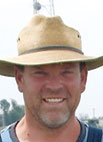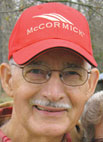
“If my cows get out, they’re in the next county before I know it,” joked David Hirschler.
David and Andrea Hirschler own 349 acres smack-dab on the southern Dade County line.
Nebraska-born, Aurora-raised, Kansas-educated (Andrea is from Colorado), David spent much of his career managing a large dairy in Nebraska. Long hours, regulations, absentee-owners, labor issues and more, with a 500-cow confinement dairy, prompted him to consider something and somewhere else.
At a Milk Expo in Sioux Falls, he encountered a vet from his childhood, which led him to a grazing seminar in southwest Missouri; another step in taking his family to the dairy they now own.
“I came to a southwest Missouri grazing conference in 2009 and saw three people running a 500-cow dairy. I was in love instantly,” David noted as he expressed his admiration for the New Zealand model with its emphasis on using grass and labor efficiency.
In April 2013, the Hirschlers loaded up their 350 cows and headed for Missouri. “We milked in Nebraska in the morning.” After some difficulty getting cows used to a new location, new barn and which way to turn into the parlor, “We milked that night right here,” noted Andrea. With one hired-hand, she ran the dairy for a couple of months until David could wrap up things in Nebraska.
“We had traded wages and bonuses for livestock so we were able to do it,” David share about moving so many cattle, so far, instead of starting over.
Another reason for moving the herd… the Hirschlers are after a certain type of genetics. David explained, “We were infusing genetics we were interested in due to our research. We believe that A2 milk has health benefits.” The Hirschlers make no health claims about their milk. There are plenty of claims and counter-claims about both A1 and A2 milk. “We want a herd that is homozygous A2.” He buys semen from bulls that are tested homozygous A2, and either he or Andrea AI all their cows.
Just under 200 cows are milked. The entire herd of 350 is a mix of what David calls mongrels; only a few cows are high percentage Holstein. Some are Fleckveih, some Dutch Belt and some even have some Dexter in them.
“Our cows (in Nebraska) never had to walk more than the distance from their bed to their bunk. It has been a challenge for some of the older girls,” David talks about moving hundreds of miles and transitioning from a confinement operation to one based almost completely on grass, “but the young heifers that calved here are transitioning well.”
The Hirschlers recently started selling their milk to Central Equity. “It came down to dollars and cents. We have to pay for this farm.”
It is a family operation with all four children taking part in daily chores. Andrea noted, “We start at 4 a.m., and finish up around 10 p.m. We don’t work all those hours – but we do everything as a family.” Just prior to this interview 12-year-old Brianna and her younger sister had fed the bottle babies.
“Our goal is to have a product that is very healthy. The higher production, the more diluted you get. A cow can only eat so much. Our goal is to have…” David stopped and asked Andrea to share their mission statement.
Andrea articulated it. “Our goal, our mission statement is to produce a clean, safe, healthy product that is pleasing to God, our community, our family and the environment.”
When pressed on how they are doing on these goals David starts with healthy. “We are trying to get the land healthy. If the ground is healthier then the animals will be healthier.” They rarely use antibiotics. “My goal,” David noted, “is to get the drugs out.” He turned to Andrea and asked, “How close are we?” Andrea replied, “We treat less than one mastitis case a month on average.”
“We want a safe product,” David continued. “Anytime we are working around animals and other people we want to be safe but we also do our best not to spread too many chemicals on the farm.”
“But we have to earn the right not to use pesticides. We have to do things to allow the animals to be protected naturally.”
Driving in his mule – all four kids in back – he saw some Canadian geese in the distance. “I’ve noticed a lot of insect-eating-birds and that’s nice. We will probably put in some birdhouses.”
Later, all four kids helped David move a couple of sections of electric fencing used in the grazing operation. Cows are moved from fields rich in clover, to fescue, back to clover plus trips to the milking parlor.
Folks may not think about an agricultural operation being pleasing to God. David responded, “We don’t want to be destroying the earth or the environment and think that would be pleasing to God. If we can take care of the animals and the land, I think that would hopefully be pleasing to God.”
David and Andrea see more transitions ahead. “We’d like to mentor people and help them get started.” As for his own children and the dairy in the future? “When they kick us to the curb, they might try something like artisanal cheese.”
For now though the kids seem happy just to be outside, working with mom and dad.







